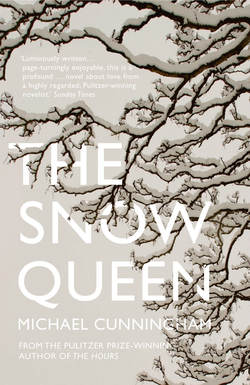Читать книгу The Snow Queen - Michael Cunningham - Страница 13
ОглавлениеBack from his run, Barrett enters the apartment, its warmth and its smell: the damp-wood sauna steam exhaled by its ancient radiators; the powdery scent of Beth’s medicines; the varnish-and-paint undertones that refuse to dissipate, as if something in this old dump can’t fully absorb any attempt at improvement; as if the ghost that is the building itself cannot and will not believe that its walls aren’t still bare, smoke-stained plaster, its rooms no longer inhabited by long-skirted women sweating over stoves as their factory-worker husbands sit cursing at kitchen tables. These recently enforced home-improvement smells, this mix of paint and doctor’s office, can’t do much more than float over a deep ur-smell of ham fat and sweat and spunk, of armpit and whiskey and wet dark rot.
The apartment’s warmth brings a tingling numbness to Barrett’s skin. On his morning runs he joins the cold, inhabits it the way a long-distance swimmer must inhabit water, and only when he’s back inside does he understand that he is in fact half frozen. He’s not a comet after all, but a man, hopelessly so, and, being human, must be pulled back in—to the apartment, the boat, the space shuttle—before he perishes of the annihilating beauties, the frigid airless silent places, the helixed and spiraled blackness he’d love to claim as his true home.
A light appeared to him. And vanished again, like some unwelcome memory of his churchly childhood. Barrett has, since the age of fifteen, been adamantly secular, as only an ex-Catholic can be. He released himself, decades ago, from folly and prejudice, from the holy blood that arrived in cardboard cartons by way of UPS; from the stodgy, defeated cheerfulness of priests.
He saw a light, though. The light saw him.
What should he do about that?
For now, it’s time for his morning bath.
In the hall, on his way to the bathroom, Barrett passes Tyler and Beth’s door, which has yawned open during the night, as do all the doors and drawers and cabinets in this slanty apartment. Barrett pauses, doesn’t speak. Tyler is leaning out the window, naked, with his back to the open door, getting snowed upon.
Barrett has always been fascinated by his brother’s body. He and Tyler are not particularly similar, as brothers go. Barrett is a bigger guy, not fat (not yet) but ursine, crimson of eye and lip; ginger-furred, possessed (he likes to think) of an enchanted sensual slyness, the prince transformed into wolf or lion, all slumbering large-pawed docility, awaiting, with avid yellow eyes, love’s first kiss. Tyler is lithe and stringy, tensely muscled. He can look, even in repose, like an aerialist about to jump from a platform. Tyler’s is, somehow, a lean but decorative body, a performer’s body; for some reason the word “jaunty” comes to mind. Tyler is irreverent in his body. He exudes the minor devilishness of a circus performer.
He and Barrett are rarely recognized as brothers. And yet, some inscrutable genetic intention is apparent in them. Barrett knows it with certainty, though he couldn’t explain. They are similar in ways known only to them. They possess a certain feral knowledge of each other, excrescence and scat. They are never mysterious, one to another, even when they’re mysterious to everybody else. It’s not that they don’t argue or challenge; it’s just that nothing one of them does or says ever seems to actually baffle the other. They seem to have agreed, long ago, without ever speaking about it, to keep their affinities secret when they’re in company; to bicker at dinner parties, to vie for attention, to carelessly insult and dismiss; to act, in public, like ordinary brothers, and keep their chaste, ardent romance to themselves, as if they were a two-member sect, passing as regular citizens, waiting for their moment to act.
